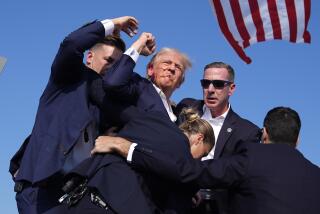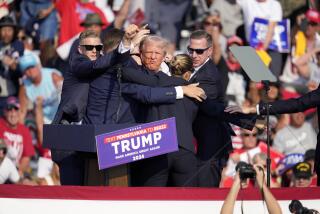Witnesses Recount Attack on Suu Kyi
- Share via
CHIANG MAI, Thailand -- Some of the attackers were convicts disguised as monks. Others were Myanmar soldiers, police and members of a pro-government militia paid to join the mob. Together they numbered in the thousands, according to witness accounts.
Armed with sharpened bamboo sticks and metal pipes, they were waiting when Nobel Peace Prize winner Aung San Suu Kyi approached the town of Dipeyin after dark May 30. When a barbed-wire barricade forced her motorcade to halt, the thugs surged forward and began beating her followers.
In what appears to have been a well-planned, government-sponsored attack, at least four of the opposition leader’s supporters were killed. Some had tried to protect Suu Kyi with their bodies, witnesses reported. She narrowly escaped the attack but was detained soon after and has been held since.
Much of what is known about the attack is based on statements from unnamed witnesses that were obtained by Suu Kyi’s supporters and distributed to journalists outside the country by pro-democracy groups, including the National Council of the Union of Burma. Last week, the U.S. mission in Myanmar, formerly known as Burma, sent a team to investigate the scene of the attack and found evidence consistent with the witness accounts, including weapons and bloody clothing that had been left behind.
The attack on Suu Kyi appears to be the latest in a series of attempts by Myanmar’s military government or its supporters to crush the long-suffering democracy movement and Suu Kyi’s party, the National League for Democracy.
Some of Suu Kyi’s supporters believe that the attack was an attempt to assassinate the charismatic 57-year-old, who would have become the country’s leader 13 years ago if the military had honored the results of parliamentary elections. But the government has blamed Suu Kyi for the violence, saying she had angered people by criticizing the regime. Officials said the attack was triggered when her convoy attempted to plow through a crowd that was blocking the road.
One witness who was hired to participate in the attack but decided to run away reportedly said: “There could be as many as 100 killed in the attack. It was the regular army soldiers and criminal elements who posed as monks who did the hitting.”
U.N. Special Envoy Razali Ismail, who spent five days in Myanmar trying to negotiate Suu Kyi’s release, left the country Tuesday without success.
Shortly before his departure, Razali was allowed to meet with Suu Kyi for an hour at the government’s headquarters. He said afterward that she showed no signs of having been injured in the melee. Razali was the first visitor permitted to see her. It remains unclear where she is being held.
Razali told reporters that he could not shed any light on what happened May 30 because Suu Kyi did not give details of the incident. “She did not see it all,” he told reporters after landing in Singapore.
In Yangon, Myanmar’s capital, officials said Suu Kyi would be released soon but did not specify when. “The safe custody measures instituted are temporary, and they will be lifted as soon as the situation returns to normal,” Deputy Foreign Minister Khin Maung Win said.
The U.S. mission team that investigated the scene of the violence in northern Myanmar found evidence that it said indicated that the attack had been planned well in advance.
The attack took place at a natural chokepoint where the road narrowed to cross a small bridge. Shards of glass, broken taillights and blood-soaked clothes littered the scene. Left behind were several weapons, including hefty, foot-long, sharpened bamboo sticks and a broken wooden club, complete with a wrist strap.
The U.S. officials also found white armbands that matched the description of armbands allegedly worn by assailants who masqueraded as Buddhist monks. The armbands reportedly allowed the attackers to distinguish one another from true monks who were traveling with Suu Kyi.
In uncharacteristically harsh language, the U.S. State Department issued a statement last week calling the incident a “premeditated ambush” carried out by “government-affiliated thugs.”
Khin, the deputy foreign minister, denied that the attack was planned and insisted that only four people had died. “Allow me to say categorically that the allegations that the attack was premeditated are unfounded,” the official said.
Witness statements provided to The Times included accounts from people described as a National League for Democracy member who was part of Suu Kyi’s entourage, a driver who took attackers to the scene and said he was forced to transport 17 bodies after the clash, and the militia member who said he was so horrified by the bloodshed that he ran away.
It was not possible to verify the accounts independently because The Times, like other news organizations, has not been allowed to enter the country.
The party member reportedly said that when the motorcade was forced to a halt, some of the attackers pulled Suu Kyi’s security people from their cars and shot them; other National League for Democracy backers were beaten with sticks and pipes as they tried to guard their leader.
Another witness reportedly said he was a member of the pro-government United Solidarity and Development Assn. militia and was hired to take part in the attack. According to his account, he was among 3,000 people mobilized for the attack and was paid the equivalent of $80 a day, a huge sum in Myanmar, plus meals. The recruiting began four days before the incident, and an army base was used as a staging area, he said.
“We were told that we were paid to participate in the protests against ... Aung San Suu Kyi,” he said, adding that he was one of four who ran away.
In addition to Suu Kyi, authorities arrested 18 party leaders, including Vice Chairman Tin Oo, and closed party offices around the country. Some witnesses said Tin Oo, a former general who is in his 70s, was struck on the head during the clash before he was taken into custody. Officials said Tuesday that he had not been injured and was in good health.
More to Read
Sign up for Essential California
The most important California stories and recommendations in your inbox every morning.
You may occasionally receive promotional content from the Los Angeles Times.










